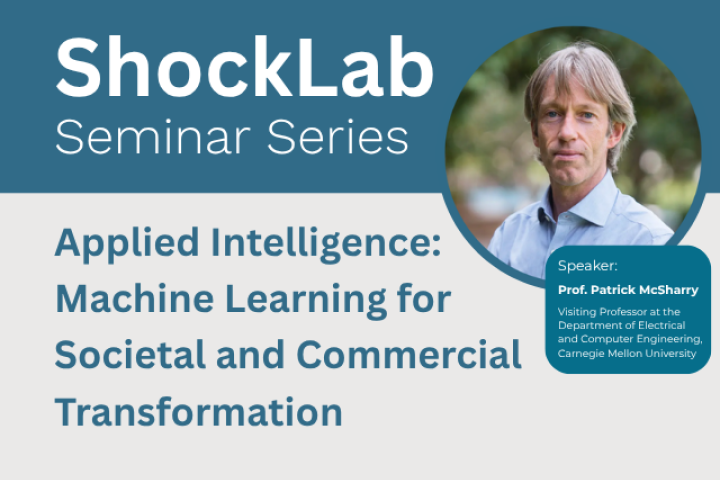ShockLab Seminar Series


Times
Wed, 30 Jul 25
16:00 - 17:00
The next Shocklab Seminar will be online on Wednesday, 30 July 2025, at 16:00 (UTC=2).Prof. Patrick McSharry will be presenting: "Applied Intelligence: Machine Learning for Societal and Commercial Transformation".
Prof. Patrick McSharry will be presenting: "Applied Intelligence: Machine Learning for Societal and Commercial Transformation".
Title: Applied Intelligence: Machine Learning for Societal and Commercial Transformation
Speaker: Prof. Patrick McSharry
Date: Wednesday, 30 July 2025
Venue: Online
Time: 16:00-17:00 (GMT +2)
Zoom Meeting Link: https://uct-za.zoom.us/j/92750361177?pwd=QzNiRzBJRjRITVlwa2k5SVNkVmx5UT09
Calendar: Event Link
Abstract: This talk explores how data-driven algorithms powered by AI and machine learning can enhance decision-making by predicting both rewards and risks. Through real-world examples in finance, energy, climate, economics, and health, I will demonstrate how AI is transforming service delivery to be more inclusive, efficient, and cost-effective. From improving forecasting to optimising complex systems, AI is reshaping our ability to solve problems with impact and intelligence.
Bio: Patrick McSharry is a Visiting Professor at the Department of Electrical and Computer Engineering, Carnegie Mellon University, Research Fellow at the Kigali Collaborative Research Centre (KCRC) and Strategic Advisor to the World Bank funded African Centre of Excellence in Data Science (ACE-DS). Prof McSharry is a Fellow of the Royal Statistical Society, Senior Member of the IEEE and advises organizations in the public and private sectors such as the World Bank, OECD's Global Partnership on Artificial Intelligence (GPAI), Mastercard Foundation, Google Foundation, GSMA Foundation's Inclusive Tech Lab and the United Nations International Telecommunication Union (ITU) “AI for Good” initiative. He was a Royal Academy of Engineering Research Fellow at Oxford University and held two EU Marie Curie Fellowships (Oxford University, UK and Spain). He takes a multidisciplinary approach to developing quantitative techniques for automating decision-making and improving risk management. His research focuses on artificial intelligence, machine learning, data science, big data, forecasting, predictive analytics, and human-centered design. He has published over 100 peer-reviewed papers and three books including the "Big Data Revolution" (2015). He is currently building multidisciplinary partnerships to create data-driven and sustainable solutions to global challenges.
See you there!